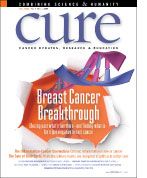Publication
Article
CURE
Screen Savers
Author(s):
One organization strives to improve cancer screening.
Don Listwin believes cancer screening wouldn’t be so controversial if tests actually screened for cancer. The problem is that most don’t. They look for an abnormal indicator, which might signify the presence of cancer. Or not. “PSA is a prostate-specific antigen,” he says. “It’s not a cancer-specific antigen.”
He envisions the day that cancer screening works more like a pregnancy test: cheap (you can buy a pregnancy kit for less than $15), precise (those little blue lines), and offering a non-invasive confirmation (ultrasound). “The problem is, we don’t have really good cancer-specific markers,” he says.
In 2004, Listwin used the fortune amassed from his years as a high-tech business executive to found the Canary Foundation, a nonprofit dedicated to early cancer detection research. His mother died in 2001 of ovarian cancer that went undetected and misdiagnosed until the disease had reached stage 4. After his mother’s diagnosis, Listwin was stunned to learn the vast majority of cancer research funding is spent to develop better drugs to rescue patients in the final stages of cancer. Few resources are devoted to improving early detection, largely, he says, because the current medical system profits from treatment. “It’s an economic problem,” he says.
Scientists at the Canary Foundation are focusing largely on finding proteins circulating in the blood produced only by cancer cells. Like pregnancy, it would be something you have or don’t have. They’re also working on molecular imaging—technology that would confirm malignancy without the need of a scalpel—for example, by making tumors light up on an ultrasound.
While such tests don’t yet exist, Canary-funded scientists already have promising leads, including a panel of four markers for ovarian cancer about to be tested in high-risk patients, and a gene that may be involved in pancreatic cancer. Listwin has set a goal to have clinical tests in place for all major tumor types by 2015, tests that would find tumors when they are no larger than 1 millimeter cubed—about the size of a pea. “If you find it at the millimeter cubed size,” he says, “you can save lives.”






